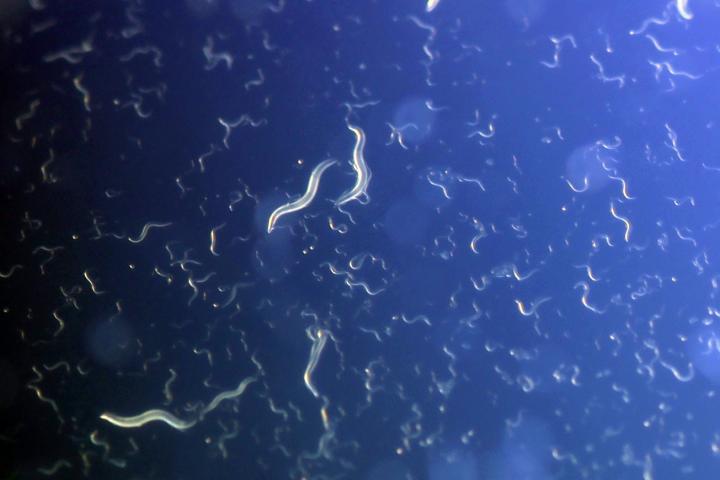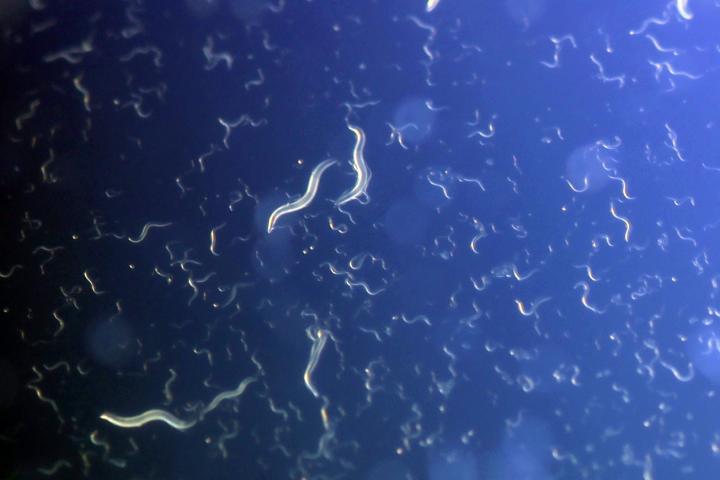
Credit: Photo by Richard Pell, Carnegie Mellon.
Going hungry at an early age can cause lifelong health problems. But the extent of malnutrition's damage depends on mom's diet too — at least in worms.
A Duke University study of the tiny nematode worm C. elegans finds that young worms that don't get anything to eat in the first few days of life are buffered from early starvation's worst effects if their mothers had also been underfed.
The study appeared October 26 in the journal PLOS Genetics.
Millimeter-long C. elegans worms live in soils and rotting vegetation, where they feed on microbes such as bacteria. A team led by Duke assistant professor L. Ryan Baugh fed one group of pregnant worms a normal diet of bacterial broth, and another group of expectant worms a watered-down version.
The researchers then reared the offspring of both groups without food for the first eight days of life, and monitored their growth and fertility over their lifespan. As expected, after eight days of starvation, the deprived larvae grew slower and were less fertile than worms that had a healthier start in life.
But surprisingly, starved worms whose mothers ate watered-down food during pregnancy weren't as stunted as the offspring of well-fed mothers.
The differences lasted throughout their lifetimes. Baby worms born to underfed moms continued to make a better recovery long after the famine ended.
"They didn't completely escape the adverse effects of early life starvation, but they were buffered from them," Baugh said.
The results are consistent with an idea from research on humans called the thrifty phenotype hypothesis. First proposed more than 20 years ago to explain the rise in type 2 diabetes in Western countries, the thinking is that pregnant women who don't get enough to eat program their babies with "thrifty" metabolisms that are good at rationing nutrients and storing fat.
Thrifty metabolisms can spell trouble later in life if mothers raised in scarcity have children raised in abundance, as is thought to be the case for many modern humans. But the Duke study shows that reprogramming an unborn baby's metabolic thermostat can be a good thing for babies that grow up in the same scarce conditions their mothers did.
In Baugh's study, the effects of prenatal nutrition were only apparent for worms born in lean times. Baby worms reared in plentiful conditions did well whether their moms got enough to eat during pregnancy or not.
"These animals are able to anticipate adverse conditions based on their mothers' experience," Baugh said. "But if the environment actually changes for the better, the worms are able to sense and respond to good conditions and make the best of it."
The molecular mechanisms behind the buffering effects of maternal diet are still unclear.
Dwindling food supplies during pregnancy seem to trigger worm mothers to make bigger, better-provisioned eggs for the lean times that may lie ahead, the study shows.
One possibility is that hunger during pregnancy slows the rate of ovulation, so that the developing egg has more time to grow before it gets fertilized.
It's also possible that maternal diet causes changes in gene expression that are passed down to her offspring.
Baugh's team is now focusing on a network of genes known from other C. elegans studies to regulate the movement of fats between eggs and other cells in the worm's body.
"Mom somehow provisions the embryo, or programs it," Baugh said.
###
Other authors on this study include Jonathan Hibshman and Anthony Hung of Duke. This research was supported by the National Science Foundation (IOS-1120206) and the National Institutes of Health (R01GM117408-01).
CITATION: "Maternal Diet and Insulin-like Signaling Control Intergenerational Plasticity of Progeny Size and Starvation Resistance," Jonathan Hibshman, Anthony Hung and L. Ryan Baugh. PLOS Genetics, October 26, 2016. DOI: 10.1371/journal.pgen.1006396
Media Contact
Robin Ann Smith
[email protected]
919-681-8057
@DukeU
http://www.duke.edu





